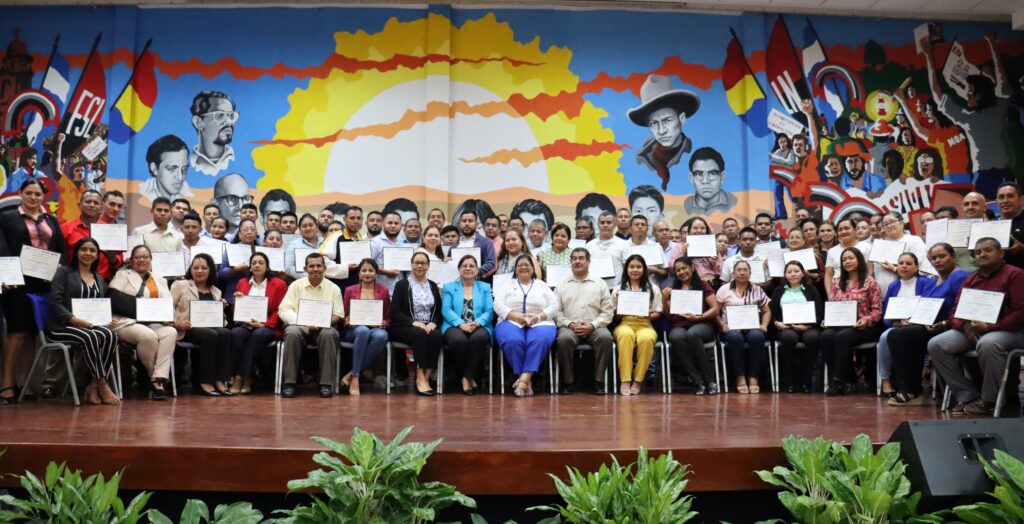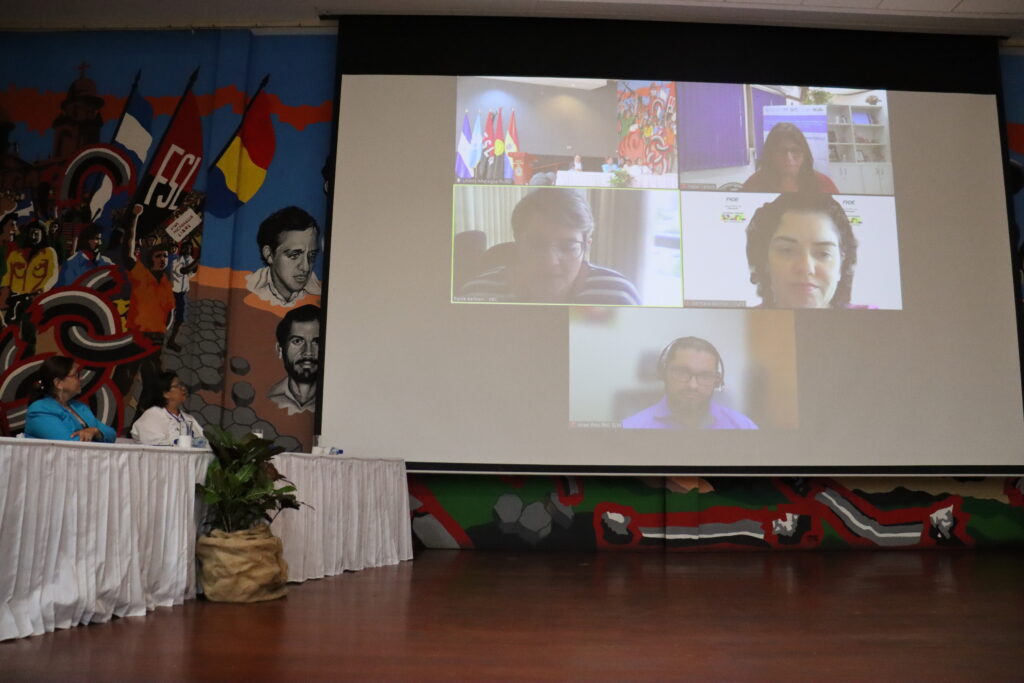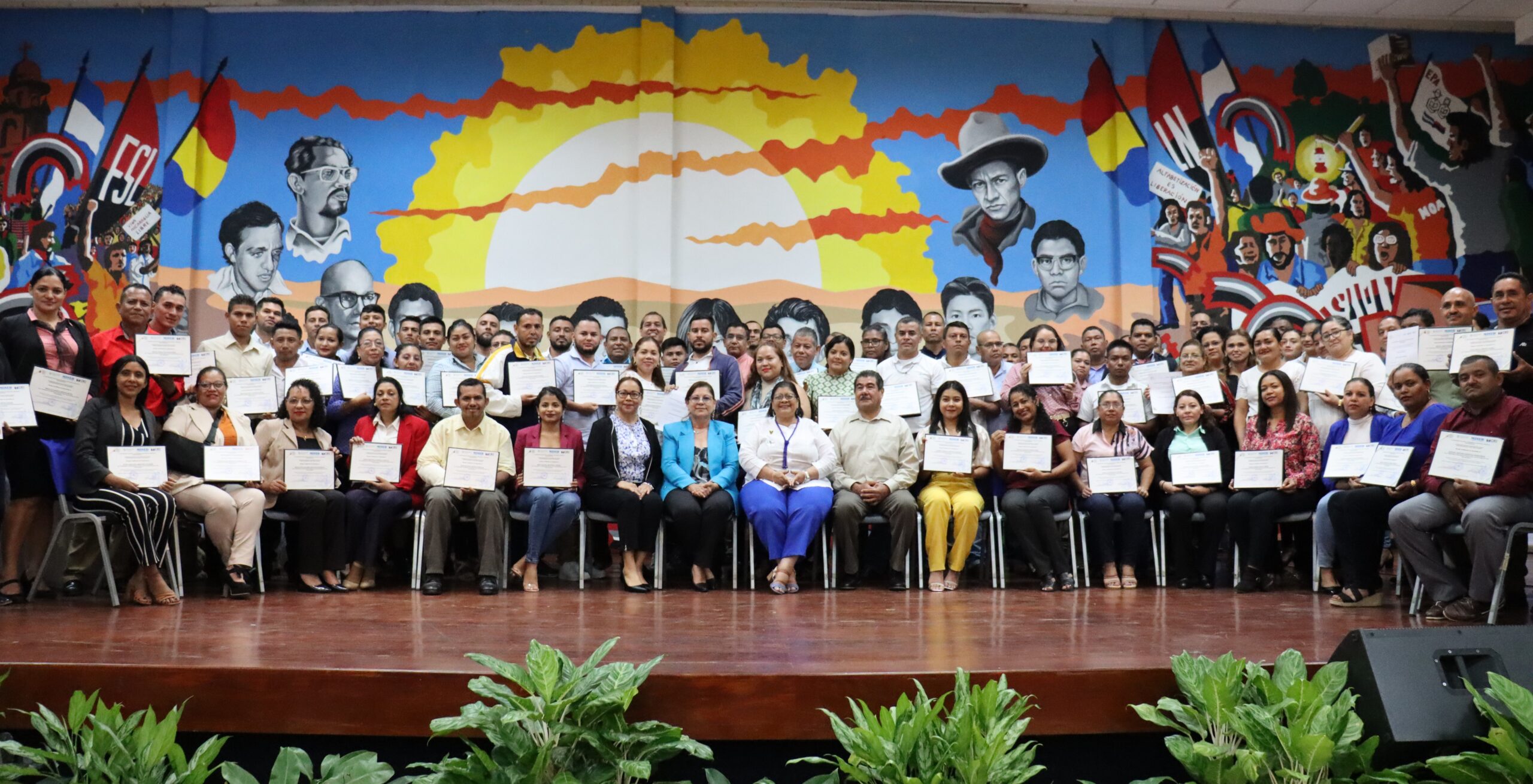97 professionals from the educational system completed the training process to contribute to food and nutritional security in schools throughout the country.
Paulo Beraldo and Enmanuel Castro
Photos: Enmanuel Castro/FAO Nicaragua
Brasilia, Brazil, October 2, 2023 – The Ministry of Education (MINED), in partnership with the National Autonomous University of Nicaragua UNAN-Managua, the National Council of Universities (CNU), the Food and Agriculture Organization of the United Nations (FAO), with the support of International Cooperation Brazil-FAO, implemented the training course “School Feeding as a Strategy for a Healthy Life.”
The course was conducted virtually through the Open University Online of Nicaragua (UALN), with the participation of 97 professionals from the educational system. They strengthened technical and methodological capacities to contribute to the enhancement of public policies in school feeding throughout the country, implementing them in schools through the promotion of healthy habits and nutritional practices.
Ramona Rodríguez, rector of UNAN-Managua and president of CNU, highlighted: “The course is a victory achieved by the entire educational system. Educational actions must have a comprehensive approach. Healthy school menus and school feeding activities should be conceived as tools for learning, as proposed by the FAO, fostering the educational community to improve their food choices.”
Liliam Herrera, Minister of Education, commented that professionals who took the course have the responsibility to learn and continue to contribute significantly to the development of childhood. “If you do not prepare yourselves, we cannot continue to advance in educational quality,” she said.

Brazil-FAO Cooperation and its support for school feeding
The course was developed within the framework of the project “Consolidation of School Feeding Programmes in Latin America and the Caribbean,” executed by the Brazil-FAO Cooperation. This cooperation comprises the Brazilian Cooperation Agency (ABC), the National Fund for Educational Development (FNDE), and the FAO.
Paola Barbieri, project analyst at the Brazilian Cooperation Agency, praised the serious and committed work of UNAN-Managua, teachers, and the support of the Nicaraguan government throughout the course. She reinforced the agency’s support in strengthening the capacities of local professionals to promote the development of countries. “One of the main reasons for the existence of ABC and our Cooperation is to support the exchange of knowledge and the strengthening of capacities, at the institutional, organizational, and individual levels in partner countries. We are confident that the results of this training will enrich the training processes to be carried out within the scope of our Sustainable School Feeding Network (RAES).”
“May this practice serve as inspiration to be shared by the countries that are part of RAES,” added Germana Belchior, on behalf of FNDE. “It is necessary to understand school feeding not only in its nutritional nature but as a human and fundamental right for the dignity of youth and children. In this sense, teacher training and training actions are important to achieve this goal”

Najla Veloso, coordinator of the school feeding project of the Brazil-FAO Cooperation, added that strengthening the capacities of professionals and technicians contributes to the sustainability of the policy. She commented that this enables people to have empowered thinking, a comprehensive and intersectoral vision, strengthening healthy food environments and a more conscious mentality about the benefits of school feeding. “Actions like these enable professionals to make a more qualified contribution from where they work.”
With this course in school feeding, FAO and the International Technical Cooperation of Brazil contribute to transforming the lives of thousands of boys and girls throughout the country by strengthening the capacities of teachers, technicians, pedagogical advisors, and tutors to ensure that Nicaraguan children have access to a balanced diet, allowing them to grow strong and healthy and improve their educational quality.
That was what Professor Manuel de Jesús spoke about, evaluating that the training process is vital for the quality of children’s education. “There cannot be an educational process without integral training. And within it, talking about food and nutritional security is a priority. We must make this knowledge come alive and make practical each of the modules we received.”
Jacqueline Bonilla, senior specialist in food security at FAO Nicaragua, highlighted that “school feeding is a strategy with the potential to make a real difference in the health, education, and well-being of children.” The learnings acquired by the professionals can be incorporated into the implementation of the Food and Nutritional Security Strategy developed by the Ministry of Education, based on the pillars of Nutritional Education, school snacks, school gardens, and hygiene. The participants emphasized the importance of the course in their professional training, thus contributing to achieving the goals outlined in the National Plan to Combat Poverty and Human Development 2022-2026.






